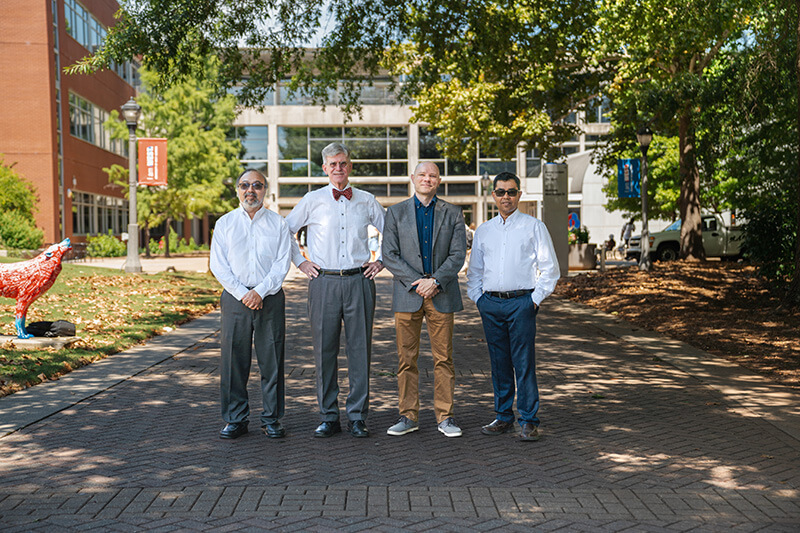A ‘Nanoscience Revolution’: U.S. Department of Defense Awards UWG Largest Instrumentation Grant in DecadesShare this page
Bearing witness to the University of West Georgia’s excellence in undergraduate research, the newly named Dr. James ‘Earl’ Perry College of Mathematics, Computing and Sciences recently received the university’s largest instrumentation grant in more than 25 years.

The United States Department of Defense (DoD) announced a $413,000 award to UWG to support the purchase of major equipment to increase current and develop new research capabilities. As part of an overall package totaling $161 million across 120 higher education institutions, UWG joined the Georgia Institute of Technology as the only universities in Georgia to receive the highly prestigious award. UWG was also the only undergraduate institution among awardees.
The project, “Subnanosecond Time-Resolved Emission Spectrometer for Investigating Nanomaterials, Soft Materials and Self-assembled Systems,” was spearheaded by principal investigator (PI) Dr. John Hansen, professor of chemistry, whose team included co-PIs Dr. Farooq Khan, professor of chemistry; Dr. Martin McPhail, associate professor of chemistry; Dr. Ajith DeSilva, professor of physics; and Dr. Swamy Mruthinti, professor of biology.
“We are thrilled that Dr. Hansen and his grant-writing team’s submission was accepted for this prestigious award,” said Dr. Brian Mosier, UWG’s associate vice president of innovation and research. “The instrumentation purchased with this grant will give students access to cutting-edge research in condensed matter and materials science. This award not only elevates our academic and research programs but also paves the way for future competitive funding opportunities and collaborations with the Department of Defense, the Department of Energy, the National Science Foundation, and regional institutions and industries, further establishing UWG as a leader in innovation and regional development.”
The equipment referred to is a time-resolved spectrometer that helps scientists study how special materials emit light or energy over incredibly short timescales – between 1 trillionth of a second up to 1 billionth of a second – in which most chemical reactions occur. This allows for valuable insight into the materials’ behavior and properties.
“Fluorescence plays a key role in how plants capture and use sunlight to create energy, like how we’re trying to harness solar energy for renewable power,” explained Hansen. “By studying how light is absorbed and emitted by materials, we can better understand these processes, which can lead to the development of new materials and technologies with exciting possibilities for our society and economy. The nanoscience revolution has just begun, and this grant has given us the tools to explore this wonderful new world.”
Joining a list of notable universities such as the Massachusetts Institute of Technology and Harvard, Hansen said he and his co-PIs – all who serve in UWG’s School of Field Investigations and Experimental Sciences – were excited about the prestigious and highly competitive award, which falls under DoD’s Defense University Research Instrumentation Program (DURIP).
DURIP is administered through a merit competition by the Air Force Office of Scientific Research, Army Research Office, and Office of Naval Research, and seeks specific proposals from university investigators conducting foundational science and engineering research relevant to national defense. The Army Research Office is an element of the U.S. Army Combat Capabilities Development Command’s Army Research Laboratory.
Hansen cited the university’s dedication to excellence and innovation as key factors in securing the high-profile grant to fund the acquisition of technology, further bolstering the already robust undergraduate research opportunities. He added that the activities that will result from the DURIP grant align well with UWG’s Quality Enhancement Plan, “Career Readiness through Experiential Learning.”
“Several of us who are authors on this grant have been educated and trained at the finest universities in the world, and we want to afford our students similar opportunities to work on current research projects using state-of-the-art instrumentation,” he concluded. “It also helps fulfill our goal to prepare students for careers in a wide variety of fields, including those that impact human health and are critical to renewable energy. This grant is the beginning of a much larger effort that will facilitate student and faculty research.”
photography by Hailey Wilkinson
